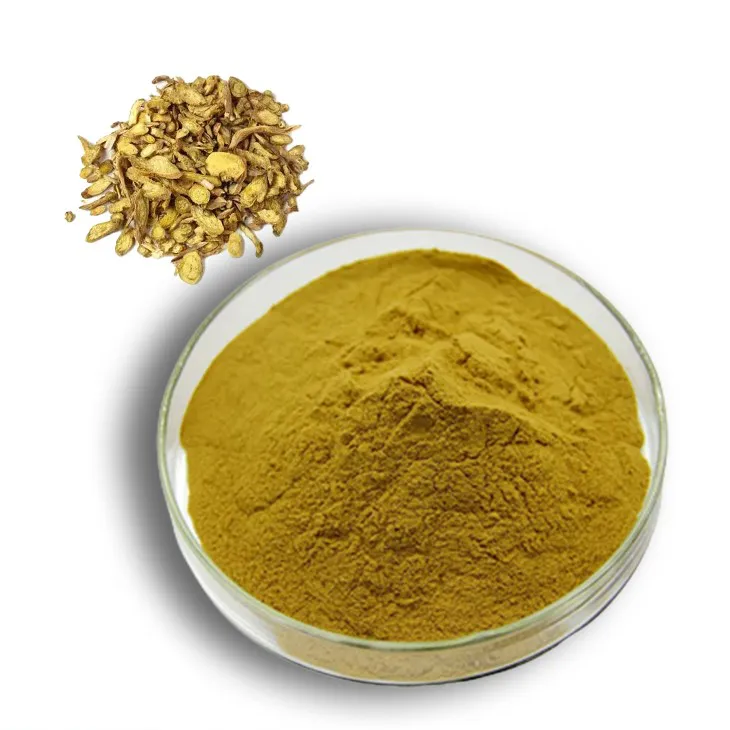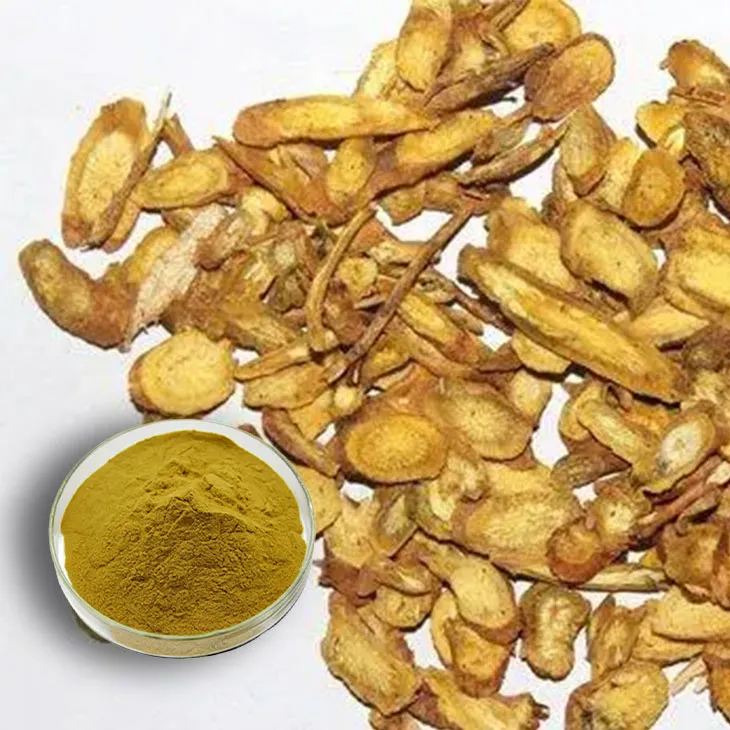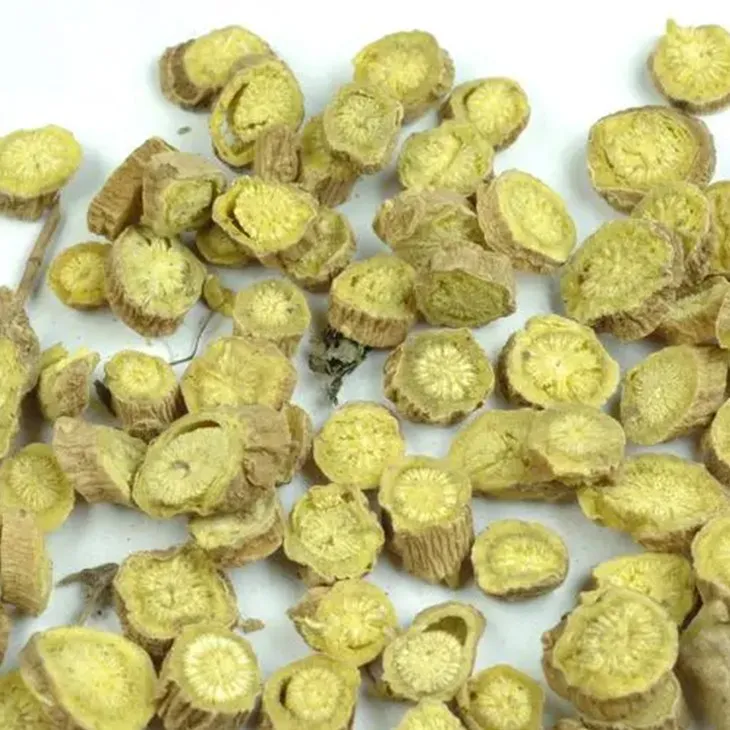- 0086-571-85302990
- sales@greenskybio.com
All the Benefits of Baicalin.
2024-11-11

1. Introduction to Baicalin
Baicalin is a flavonoid compound that has been widely studied for its various health - promoting properties. It is naturally found in certain plants, such as Scutellaria baicalensis Georgi, which has been used in traditional medicine for centuries. The unique chemical structure of Baicalin endows it with a wide range of biological activities, making it a compound of great interest in the fields of medicine, pharmacology, and dermatology.

2. Benefits for Skin Health
2.1 Anti - Inflammatory Properties
One of the most notable benefits of baicalin for skin health is its anti - inflammatory effect. Skin conditions such as acne, eczema, and psoriasis are often associated with inflammation. Baicalin can inhibit the production of pro - inflammatory cytokines, such as interleukin - 1β (IL - 1β) and tumor necrosis factor - α (TNF - α). These cytokines play a crucial role in the initiation and amplification of the inflammatory response in the skin. By reducing their levels, baicalin can effectively alleviate the redness, swelling, and pain associated with inflammatory skin conditions.
2.2 Antioxidant Effects
Baicalin also exhibits strong antioxidant properties. The skin is constantly exposed to environmental stressors, such as ultraviolet (UV) radiation, pollution, and free radicals. These factors can cause oxidative damage to skin cells, leading to premature aging, wrinkles, and a dull complexion. Baicalin can scavenge free radicals, such as superoxide anions and hydroxyl radicals, and protect skin cells from oxidative damage. It also enhances the activity of antioxidant enzymes in the skin, such as superoxide dismutase (SOD) and catalase, further strengthening the skin's antioxidant defense system.
2.3 Promotion of Skin Cell Regeneration
Another important aspect of baicalin's role in skin health is its ability to promote skin cell regeneration. It can stimulate the proliferation of keratinocytes, which are the main cells in the outermost layer of the skin. This helps in the repair of damaged skin tissues, accelerates wound healing, and improves the overall texture and appearance of the skin. Baicalin also has a positive impact on fibroblasts, which are responsible for producing collagen and elastin in the skin. By promoting the function of fibroblasts, it can enhance the production of these important skin structural proteins, leading to firmer and more elastic skin.

3. Cardiovascular Health Benefits
3.1 Regulation of Blood Lipid Levels
Baicalin plays a significant role in maintaining cardiovascular health by regulating blood lipid levels. High levels of low - density lipoprotein cholesterol (LDL - C) and triglycerides are risk factors for atherosclerosis and heart disease. Baicalin can lower LDL - C levels by inhibiting the synthesis of cholesterol in the liver and promoting the excretion of cholesterol from the body. It also has an effect on triglyceride metabolism, reducing the production and accumulation of triglycerides in the blood.
3.2 Reduction of Blood Viscosity
Blood viscosity is an important factor in cardiovascular health. High blood viscosity can impede blood flow, increase the risk of thrombosis, and put extra strain on the heart. Baicalin can reduce blood viscosity by inhibiting platelet aggregation. Platelets are cell fragments in the blood that play a key role in blood clotting. When platelets aggregate excessively, it can lead to the formation of blood clots. Baicalin inhibits platelet activation and aggregation, thereby reducing blood viscosity and improving blood flow.
3.3 Prevention of Atherosclerosis
The combined effects of baicalin on blood lipid regulation and blood viscosity reduction contribute to the prevention of atherosclerosis. Atherosclerosis is a chronic inflammatory disease characterized by the buildup of fatty plaques in the arteries. These plaques can narrow the arteries, restrict blood flow, and eventually lead to heart attacks and strokes. Baicalin can inhibit the formation of atherosclerotic plaques by reducing inflammation, lipid deposition, and platelet activation in the arterial walls.

4. Hepatoprotective Properties
4.1 Protection Against Toxin - Induced Liver Damage
The liver is the body's major detoxification organ, but it is also vulnerable to damage from various toxins. Baicalin has been shown to have hepatoprotective properties, protecting the liver from damage caused by toxins. For example, in cases of exposure to certain drugs or environmental toxins, baicalin can reduce the oxidative stress and inflammation in the liver. It can also enhance the liver's detoxification ability by modulating the activity of liver enzymes involved in the metabolism of toxins.
4.2 Defense Against Drug - Induced Liver Injury
Many drugs can cause liver injury as a side effect. Baicalin can protect the liver from drug - induced liver injury. It can interfere with the toxic mechanisms of drugs in the liver, such as preventing the formation of reactive metabolites that can damage liver cells. Additionally, it can promote the repair of damaged liver cells by stimulating the regeneration of hepatocytes.
4.3 Protection Against Oxidative Stress in the Liver
Oxidative stress is a major factor contributing to liver damage. Baicalin's antioxidant properties are also beneficial for liver health. It can scavenge free radicals in the liver, reducing oxidative damage to liver cells. This helps in maintaining the normal structure and function of the liver, preventing liver diseases such as fatty liver, hepatitis, and liver cirrhosis.

5. Anti - Cancer Potential
5.1 Inhibition of Cancer Cell Proliferation
Recent research has suggested that baicalin may have anti - cancer potential. It can inhibit the proliferation of various cancer cells, including cancer cells in the breast, lung, colon, and liver. Baicalin can interfere with the cell cycle of cancer cells, arresting them at specific phases and preventing their uncontrolled growth. This is achieved through multiple mechanisms, such as modulating the expression of cell cycle - related proteins and genes.
5.2 Induction of Cancer Cell Apoptosis
Another important anti - cancer mechanism of baicalin is the induction of cancer cell apoptosis. Apoptosis is a programmed cell death process that is disrupted in cancer cells. Baicalin can activate the apoptotic pathway in cancer cells, leading to their self - destruction. It can regulate the expression of apoptotic proteins, such as caspases, which play a crucial role in the apoptotic process.
5.3 Anti - Metastatic Effects
Baicalin also shows anti - metastatic effects. Metastasis is the process by which cancer cells spread from the primary tumor to other parts of the body. Baicalin can inhibit the invasion and migration of cancer cells by interfering with the signaling pathways involved in cell motility and adhesion. This can potentially limit the spread of cancer and improve the prognosis of cancer patients.
6. Anti - Microbial Activity
6.1 Antibacterial Properties
Baicalin has been found to possess antibacterial properties. It can inhibit the growth of a variety of bacteria, including both gram - positive and gram - negative bacteria. For example, it has been shown to be effective against Staphylococcus aureus, Escherichia coli, and Pseudomonas aeruginosa. The antibacterial mechanism of baicalin may involve disrupting the bacterial cell membrane, interfering with bacterial protein synthesis, or inhibiting bacterial enzyme activity.
6.2 Antifungal Activity
In addition to its antibacterial activity, baicalin also exhibits antifungal activity. It can inhibit the growth of certain fungi, such as Candida albicans. Fungal infections can occur in various parts of the body, especially in immunocompromised individuals. Baicalin's antifungal properties make it a potential candidate for the development of new antifungal drugs.
6.3 Anti - Viral Effects
Baicalin has also shown anti - viral effects. It can inhibit the replication of some viruses, such as influenza virus and herpes simplex virus. The anti - viral mechanism may involve interfering with viral entry into host cells, blocking viral gene expression, or inhibiting viral protein synthesis.
7. Neurological Benefits
7.1 Neuroprotective Effects
Baicalin has neuroprotective properties, which are beneficial for maintaining the health of the nervous system. It can protect neurons from damage caused by oxidative stress, inflammation, and excitotoxicity. In neurodegenerative diseases such as Alzheimer's disease and Parkinson's disease, there is an accumulation of oxidative damage and inflammation in the brain. Baicalin can reduce these pathological processes, potentially slowing down the progression of these diseases.
7.2 Anti - Anxiety and Anti - Depressant - Like Effects
Studies have also suggested that baicalin may have anti - anxiety and anti - depressive - like effects. It can modulate the levels of neurotransmitters in the brain, such as serotonin, dopamine, and gamma - aminobutyric acid (GABA). These neurotransmitters play important roles in mood regulation. By influencing their levels, baicalin may help to relieve anxiety and depressive symptoms.
8. Conclusion
In conclusion, baicalin is a compound with a wide range of health benefits. Its properties in skin health, cardiovascular health, liver protection, anti - cancer potential, anti - microbial activity, and neurological benefits make it a very promising compound for further research and development. However, more studies are needed to fully understand its mechanisms of action and to explore its potential applications in clinical medicine. With continued research, baicalin may one day become an important component in the prevention and treatment of various diseases.
FAQ:
What are the anti - inflammatory effects of baicalin on the skin?
Baicalin has anti - inflammatory properties in skin health. It can reduce inflammation associated with skin conditions like acne, eczema, and psoriasis. This helps to soothe the skin and relieve symptoms such as redness, swelling, and itching.
How does baicalin promote skin cell regeneration?
The exact mechanism by which baicalin promotes skin cell regeneration is complex. However, its antioxidant and anti - inflammatory properties likely play a role. By reducing oxidative stress and inflammation, it creates a more favorable environment for skin cells to divide and regenerate, which can lead to healthier and more youthful - looking skin.
Can baicalin really prevent atherosclerosis?
Yes, baicalin can help prevent atherosclerosis. It can regulate blood lipid levels, for example, by reducing the levels of harmful lipids such as LDL (low - density lipoprotein). It also reduces blood viscosity, which in turn helps to keep the blood vessels clear and reduces the risk of plaque formation, a key factor in atherosclerosis.
How does baicalin protect the liver?
Baicalin has hepatoprotective properties. It can protect the liver from damage caused by toxins, drugs, and oxidative stress. It may act by neutralizing harmful substances or by enhancing the liver's own antioxidant defense mechanisms, thus maintaining normal liver function.
Are there any side effects of baicalin?
While baicalin has many beneficial properties, in some cases, there may be potential side effects. However, these are relatively rare. Some people may experience mild allergic reactions, but overall, when used appropriately, it is generally considered safe. More research is still needed to fully understand all possible side effects.
Related literature
- The Pharmacological Effects of Baicalin on Skin Diseases"
- "Baicalin and Cardiovascular Health: A Comprehensive Review"
- "Hepatoprotective Mechanisms of Baicalin: Current Research"
- ▶ Hesperidin
- ▶ citrus bioflavonoids
- ▶ plant extract
- ▶ lycopene
- ▶ Diosmin
- ▶ Grape seed extract
- ▶ Sea buckthorn Juice Powder
- ▶ Beetroot powder
- ▶ Hops Extract
- ▶ Artichoke Extract
- ▶ Reishi mushroom extract
- ▶ Astaxanthin
- ▶ Green Tea Extract
- ▶ Curcumin Extract
- ▶ Horse Chestnut Extract
- ▶ Other Problems
- ▶ Boswellia Serrata Extract
- ▶ Resveratrol Extract
- ▶ Marigold Extract
- ▶ Grape Leaf Extract
- ▶ blog3
-
Cranberry Plants and Skin - care Products.
2024-11-11
-
Nettle leaf extract
2024-11-11
-
Mangosteen extract powder
2024-11-11
-
Beetroot juice Powder
2024-11-11
-
Cocoa Extract
2024-11-11
-
Dan Shen Root Extract/Salvia Root Extract
2024-11-11
-
Wheat Germ Extract
2024-11-11
-
Hesperidin
2024-11-11
-
Aguaje Extract
2024-11-11
-
Soy Extract
2024-11-11
-
Hawthorn powder
2024-11-11





















